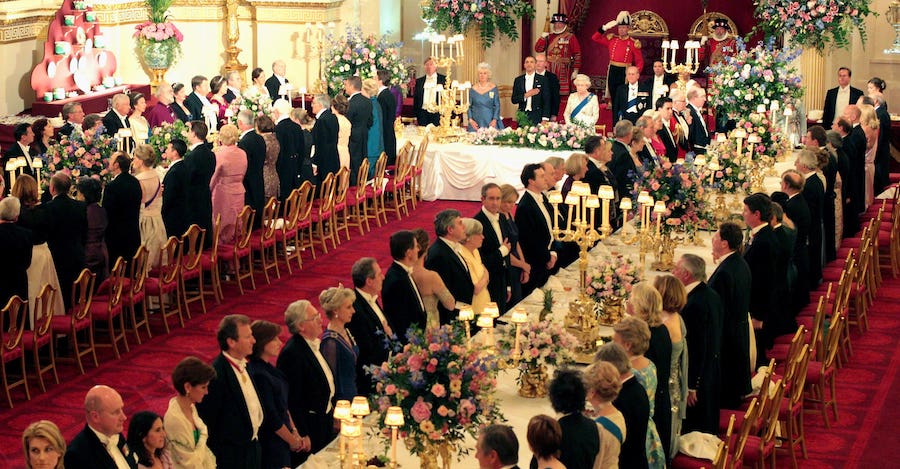How royal food and feasting have changed over the years
Historians describe how regal tastes and traditions have evolved
From coronations and weddings to state banquets, food is an important part of many royal traditions, and the monarch’s culinary choices often reflect the trends of the time.
While for members of the public celebrating at home or holding street parties, serving up a Great British menu is all part of the fun.
Ahead of the King’s coronation on May 6, here’s how regal dishes and dinners have evolved throughout the decades…
Coronation dishes

First served when Queen Elizabeth II was crowned in 1953, we now think of coronation chicken as the iconic dish to mark the crowning of a new monarch, but that wasn’t always the case.
“It was just one of many dishes and it got taken up and became synonymous with coronations after the event,” said food historian Annie Gray.
“It wasn’t originally called coronation chicken. What people had eaten celebrate coronations traditionally was beef and plum pudding.”
A mixture of shredded chicken and creamy curry sauce, the cold dish combines flavours and techniques from different countries.
“It’s sort of pleasingly exotic and yet bland at the same time,” Gray said.
“It uses curry powder, which is embedded in the British psyche, but the technique that went into it is 100% French, so it kind of melds together an awful lot of things that reflect that period.”
This year, Charles and Camilla have announced the official dish is coronation quiche filled with spinach, broad beans and tarragon.
The King and Queen Consort are encouraging people to take part in the Big Coronation Lunch with friends, family or neighbours.
Diplomacy over dinner
The royal family have been donning their finest jewels and rolling out the red carpet for visiting heads of state and dignitaries for many years – and not just as an excuse for some fine dining.
“There’s still a really huge ceremonial role for the monarchy in terms of impressing people,” Gray said.

Queen Elizabeth II, US President Barack Obama and the Duke of Edinburgh during a State Banquet in Buckingham Palace in 2011
“And in terms of the unofficial diplomacy that goes on – it’s very much about putting people in the room and facilitating discussion.”
Previously, the coronation would include a huge formal banquet, but it’s yet to be confirmed if that will be the case this time.
“I’m sure the royal family are going to eat a meal between them but we don’t expect there to be a giant banquet to which all the foreign royals are invited,” says royal historian and author Professor Kate Williams, who is working with Greene King. The brand have launched a 2023 Coronation Ale and will be auctioning off ale from King Edward VIII’s coronation for the Prince’s Trust.
“I think what the King would prefer is that everyone is doing the feasting themselves at street parties.”
Fashionable food

Windsor Castle kitchen staff preparing for a state banquet in 1998
Food and drink served at multi-course banquets has also evolved as monarchs have come and gone.
“Up to the point of the late Victorian period there was very little nod to whoever was coming to dinner,” said Gray.
“Dishes were whatever was fashionable [at the time] – and what was fashionable was French food.”
In the 20th century, royal chefs expanded their repetoire to cater to guests from around the world.
“The monarchy. especially under Bertie [Edward VII], got much more sharp about what they were serving and how to impress people,” said Gray.
“You started to see dishes appear at state banquets which were very much a nod to whoever was there.”
Let them eat cake

The cake by Claire Ptak of London-based bakery Violet Cakes for Duke and Duchess of Sussex’s wedding
Elaborate multi-tiered cakes have long been an important part of royal wedding menus – and historic slices can fetch a high price at auction.
A piece of Queen Victoria and Prince Albert’s 1840 cake sold for £1,500 in 2016.
“Queen Victoria had, as was the fashion at the time, one enormous fruitcake, and then commissioned loads of other cakes from lots of different bakers – those are the ones that were portioned up and given to guests,” Gray explained.
In recent years, royal couples have introduced their own pudding preferences, such as The Prince of Wales’ chocolate biscuit cake.

The chocolate biscuit ‘groom’s cake’ made by McVities for the wedding of William and Kate
“He had a groom’s cake, which was quite a break from tradition because the idea of a groom cake is a very sort of modern American thing,” said Gray.
“They still had a rich fruit cake as their main centrepiece, but it was iced in a very modern style.”
The Press Association
Latest posts by The Press Association (see all)
- BBC to air two-part Call The Midwife Christmas special - December 23, 2024
- 6 mind sports to exercise your brain and keep you sharp - December 20, 2024
- Quiz: What classic Christmas food or drink are you? - December 20, 2024
- Leftover turkey and watercress pie - December 20, 2024
- Catherine and William choose family shot for Christmas card photograph - December 19, 2024




















